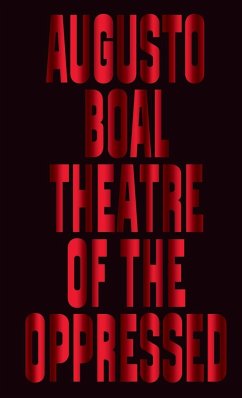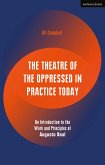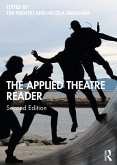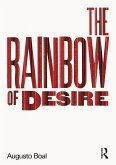Augusto Boal
Theatre of the Oppressed
Augusto Boal
Theatre of the Oppressed
- Gebundenes Buch
- Merkliste
- Auf die Merkliste
- Bewerten Bewerten
- Teilen
- Produkt teilen
- Produkterinnerung
- Produkterinnerung
The book that started a revolution in modern theatre.
Andere Kunden interessierten sich auch für
![The Theatre of the Oppressed in Practice Today The Theatre of the Oppressed in Practice Today]() Ali CampbellThe Theatre of the Oppressed in Practice Today35,99 €
Ali CampbellThe Theatre of the Oppressed in Practice Today35,99 €![The Applied Theatre Reader The Applied Theatre Reader]() The Applied Theatre Reader56,99 €
The Applied Theatre Reader56,99 €![The Rainbow of Desire The Rainbow of Desire]() Augusto BoalThe Rainbow of Desire62,99 €
Augusto BoalThe Rainbow of Desire62,99 €![Engaging Performance Engaging Performance]() Jan Cohen-Cruz (USA Syracuse University)Engaging Performance55,99 €
Jan Cohen-Cruz (USA Syracuse University)Engaging Performance55,99 €![Reinventing Pedagogy of the Oppressed Reinventing Pedagogy of the Oppressed]() Reinventing Pedagogy of the Oppressed36,99 €
Reinventing Pedagogy of the Oppressed36,99 €![Latinx Actor Training Latinx Actor Training]() Latinx Actor Training58,99 €
Latinx Actor Training58,99 €![Death and the Maiden Death and the Maiden]() Ariel DorfmanDeath and the Maiden18,99 €
Ariel DorfmanDeath and the Maiden18,99 €-
-
The book that started a revolution in modern theatre.
Hinweis: Dieser Artikel kann nur an eine deutsche Lieferadresse ausgeliefert werden.
Hinweis: Dieser Artikel kann nur an eine deutsche Lieferadresse ausgeliefert werden.
Produktdetails
- Produktdetails
- Verlag: Pluto Press
- 4 ed
- Seitenzahl: 210
- Erscheinungstermin: 1. März 2019
- Englisch
- Abmessung: 222mm x 145mm x 16mm
- Gewicht: 396g
- ISBN-13: 9780745339306
- ISBN-10: 0745339301
- Artikelnr.: 56515274
- Herstellerkennzeichnung
- Libri GmbH
- Europaallee 1
- 36244 Bad Hersfeld
- gpsr@libri.de
- Verlag: Pluto Press
- 4 ed
- Seitenzahl: 210
- Erscheinungstermin: 1. März 2019
- Englisch
- Abmessung: 222mm x 145mm x 16mm
- Gewicht: 396g
- ISBN-13: 9780745339306
- ISBN-10: 0745339301
- Artikelnr.: 56515274
- Herstellerkennzeichnung
- Libri GmbH
- Europaallee 1
- 36244 Bad Hersfeld
- gpsr@libri.de
Augusto Boal (1931-2009) was a Brazilian theatre practitioner, drama theorist and political activist. He is the author of Theatre of the Oppressed (Pluto Press, 2019).
Preface to the 2008 edition
Preface to the 2000 edition - The Unruly Protagonist
Preface to the 1974 edition
1. Aristotle's Coercive System of Tragedy
Introduction
Art Imitates Nature
What is the Meaning of 'Imitation'?
What, then, is the Purpose of Art and Science?
Major Arts and Minor Arts
What does Tragedy Imitate?
What is Happiness?
And What is Virtue?
Necessary Characteristics of Virtue
The Degrees of Virtue
What is Justice?
In What Sense can Theatre Function as an Instrument for Purifi cation and
Intimidation?
The Ultimate Aim of Tragedy
A Short Glossary of Simple Words
How Aristotle's Coercive System of Tragedy Functions
Different Types of Confl ict: Hamartia and Social Ethos
Conclusion
2. Machiavelli and the Poetics of Virtù
The Feudal Abstraction
The Bourgeois Concretion
Machiavelli and Mandragola
Modern Reductions of Virtù
3. Hegel and Brecht: The Character as Subject or the Character as Object?
The 'Epic' Concept
Types of Poetry in Hegel
Characteristics of Dramatic Poetry, Still According to Hegel
Freedom of the Character-Subject
A Word Poorly Chosen
Does Thought Determine Being (or Vice Versa)?
Can Man be Changed?
Confl ict of Wills or Contradiction of Needs?
Empathy or What? Emotion or Reason?
Catharsis and Repose, or Knowledge and Action?
How to Interpret the New Works?
The Rest Does Not Count: They Are Minor Formal Differences Between the
Three Genres
Empathy or Osmosis
4. Poetics of the Oppressed
Experiments with the People's Theatre in Peru
Conclusion: 'Spectator', a Bad Word!
5. Development of the Arena Theatre of São Paulo
Need for the 'Joker'
Goals of the 'Joker'
Structures of the 'Joker'
Appendices
Notes
Index
Preface to the 2000 edition - The Unruly Protagonist
Preface to the 1974 edition
1. Aristotle's Coercive System of Tragedy
Introduction
Art Imitates Nature
What is the Meaning of 'Imitation'?
What, then, is the Purpose of Art and Science?
Major Arts and Minor Arts
What does Tragedy Imitate?
What is Happiness?
And What is Virtue?
Necessary Characteristics of Virtue
The Degrees of Virtue
What is Justice?
In What Sense can Theatre Function as an Instrument for Purifi cation and
Intimidation?
The Ultimate Aim of Tragedy
A Short Glossary of Simple Words
How Aristotle's Coercive System of Tragedy Functions
Different Types of Confl ict: Hamartia and Social Ethos
Conclusion
2. Machiavelli and the Poetics of Virtù
The Feudal Abstraction
The Bourgeois Concretion
Machiavelli and Mandragola
Modern Reductions of Virtù
3. Hegel and Brecht: The Character as Subject or the Character as Object?
The 'Epic' Concept
Types of Poetry in Hegel
Characteristics of Dramatic Poetry, Still According to Hegel
Freedom of the Character-Subject
A Word Poorly Chosen
Does Thought Determine Being (or Vice Versa)?
Can Man be Changed?
Confl ict of Wills or Contradiction of Needs?
Empathy or What? Emotion or Reason?
Catharsis and Repose, or Knowledge and Action?
How to Interpret the New Works?
The Rest Does Not Count: They Are Minor Formal Differences Between the
Three Genres
Empathy or Osmosis
4. Poetics of the Oppressed
Experiments with the People's Theatre in Peru
Conclusion: 'Spectator', a Bad Word!
5. Development of the Arena Theatre of São Paulo
Need for the 'Joker'
Goals of the 'Joker'
Structures of the 'Joker'
Appendices
Notes
Index
Preface to the 2008 edition
Preface to the 2000 edition - The Unruly Protagonist
Preface to the 1974 edition
1. Aristotle's Coercive System of Tragedy
Introduction
Art Imitates Nature
What is the Meaning of 'Imitation'?
What, then, is the Purpose of Art and Science?
Major Arts and Minor Arts
What does Tragedy Imitate?
What is Happiness?
And What is Virtue?
Necessary Characteristics of Virtue
The Degrees of Virtue
What is Justice?
In What Sense can Theatre Function as an Instrument for Purifi cation and
Intimidation?
The Ultimate Aim of Tragedy
A Short Glossary of Simple Words
How Aristotle's Coercive System of Tragedy Functions
Different Types of Confl ict: Hamartia and Social Ethos
Conclusion
2. Machiavelli and the Poetics of Virtù
The Feudal Abstraction
The Bourgeois Concretion
Machiavelli and Mandragola
Modern Reductions of Virtù
3. Hegel and Brecht: The Character as Subject or the Character as Object?
The 'Epic' Concept
Types of Poetry in Hegel
Characteristics of Dramatic Poetry, Still According to Hegel
Freedom of the Character-Subject
A Word Poorly Chosen
Does Thought Determine Being (or Vice Versa)?
Can Man be Changed?
Confl ict of Wills or Contradiction of Needs?
Empathy or What? Emotion or Reason?
Catharsis and Repose, or Knowledge and Action?
How to Interpret the New Works?
The Rest Does Not Count: They Are Minor Formal Differences Between the
Three Genres
Empathy or Osmosis
4. Poetics of the Oppressed
Experiments with the People's Theatre in Peru
Conclusion: 'Spectator', a Bad Word!
5. Development of the Arena Theatre of São Paulo
Need for the 'Joker'
Goals of the 'Joker'
Structures of the 'Joker'
Appendices
Notes
Index
Preface to the 2000 edition - The Unruly Protagonist
Preface to the 1974 edition
1. Aristotle's Coercive System of Tragedy
Introduction
Art Imitates Nature
What is the Meaning of 'Imitation'?
What, then, is the Purpose of Art and Science?
Major Arts and Minor Arts
What does Tragedy Imitate?
What is Happiness?
And What is Virtue?
Necessary Characteristics of Virtue
The Degrees of Virtue
What is Justice?
In What Sense can Theatre Function as an Instrument for Purifi cation and
Intimidation?
The Ultimate Aim of Tragedy
A Short Glossary of Simple Words
How Aristotle's Coercive System of Tragedy Functions
Different Types of Confl ict: Hamartia and Social Ethos
Conclusion
2. Machiavelli and the Poetics of Virtù
The Feudal Abstraction
The Bourgeois Concretion
Machiavelli and Mandragola
Modern Reductions of Virtù
3. Hegel and Brecht: The Character as Subject or the Character as Object?
The 'Epic' Concept
Types of Poetry in Hegel
Characteristics of Dramatic Poetry, Still According to Hegel
Freedom of the Character-Subject
A Word Poorly Chosen
Does Thought Determine Being (or Vice Versa)?
Can Man be Changed?
Confl ict of Wills or Contradiction of Needs?
Empathy or What? Emotion or Reason?
Catharsis and Repose, or Knowledge and Action?
How to Interpret the New Works?
The Rest Does Not Count: They Are Minor Formal Differences Between the
Three Genres
Empathy or Osmosis
4. Poetics of the Oppressed
Experiments with the People's Theatre in Peru
Conclusion: 'Spectator', a Bad Word!
5. Development of the Arena Theatre of São Paulo
Need for the 'Joker'
Goals of the 'Joker'
Structures of the 'Joker'
Appendices
Notes
Index








